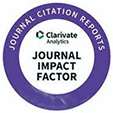Effect of Residence Time of Graphitisation on Thermal Conductivity of Molded Graphite
Pedy Artsanti(1), Yateman Arryanto(2*), Kusnanto Kusnanto(3)
(1) Department of Chemistry, Faculty of Mathematics and Natural Sciences, Universitas Gadjah Mada, Sekip Utara PO BOX BLS 21, Yogyakarta 55281
(2) Department of Chemistry, Faculty of Mathematics and Natural Sciences, Universitas Gadjah Mada, Sekip Utara PO BOX BLS 21, Yogyakarta 55281
(3) Department of Nuclear Engineering Universitas Gadjah Mada
(*) Corresponding Author
Abstract
Full Text:
Full Text PdfReferences
[1] Gulo, S., 1997, Pembuatan Grafit Impremeabel dan Kokas Minyak Bumi, Tesis Magister Sains, Fakultas MIPA Universitas Gadjah Mada, Yogyakarta
[2] Heintz, E.A., 1996, Review The Characterization of Petroleum Coke, Carbon, 34: 699-709.
[3] Incropera, F.P., and DeWitt, D.P., 1985, Introduction to Heat Transfer, John Wiley & Sons, New, York.
[4] Kakuta, M., Tanaka, H., Sato, J., and Naguchi, H., 1981, A New Calcining Technology for Manufacturing to Coke with Lower Thermal Expansion Coefficient, Carbon, 19: 347-352.
[5] Kelly, B.T., 1981, Physics of Graphite, Applied Science Publishers, London.
[6] Mateos, J.M.J., Romeo, E., and Salazar, C.G.D., 1993, XRD Study of Petroleum Cokes by Line Profile Analysis: Relation Among Heat Treatment, Structure and Sulphur Content, Carbon, 31: 1159-1178.
[7] Marinkovic, S., 1984, Subtitutional Solid Solubility in Carbon and Graphite, in Chemistry and Physics of Carbon, Ed Thower, A.P., Marcel Dekker, Inc., New York, volume 19,1
[8] Meers, J.T., Bowman, J.C., and Krumhansl, J.A., 1957, Industrial Carbon and Graphite, X-Ray and Low Temperature Thermal Conductivity Study of Defects in Graphite, Papers read at the Conference, Society of Chemical Industri, London.
[9] Omar, M.A., 1975, Elementary Solid State Physics: Principles and Applications, Addison-Wesley Publishing Company Reading, Massachusetts.
[10] Pierson, H.O., 1993, Handbook of Carbon, Graphite, Diamond and Fullerens, Properties, Processing and Applications, Noyes Publications, New Jersey.
[11] Powell R.W., 1957, Industrial Carbon and Graphite, The Thermal Conductivities of Carbons and Graphites at High Temperatures, Papers reads at the Conference, Society of Chemical Industri. London.
[12] Reynolds, W.N., 1968, Physical Properties of Graphite, Elsevier Publishing Co., Ltd, Amsterdam.
[13] Saadaoui, H,. Roux, J.C., Flandrois, S., and Nysten, B., 1993, Graphitization of Pyrocarbons: An STM Study, Carbon, 34: 481-486.
[14] Seera, M.S., and Pavlovicx, A.S., 1993, X-ray Diffraction, Thermal Expansion, Electrical Conductivity, and optical Microscopy Studies on Coal-Based Graphites, carbon, 31: 557-564.
[15] Shreve, R.N., and Brink, J.A., 1977, Chemical Process Industries, McGraw Hill Inc., Tokyo.
[16] Sogabe, T., Inagaki, M., and Ibuki, T., 1992, Coating of Graphite by Polymide and Its Gas Permeability, carbon, 30: 513-516.
[17] Weishauptova, Z., Medek, J., and Vaverkova, Z., 1992, A Change in The Porous Structure of Coke between 1540°C and 2880°C, Carbon, 30: 1055-1062.
Article Metrics
Copyright (c) 2010 Indonesian Journal of Chemistry

This work is licensed under a Creative Commons Attribution-NonCommercial-NoDerivatives 4.0 International License.
Indonesian Journal of Chemistry (ISSN 1411-9420 /e-ISSN 2460-1578) - Chemistry Department, Universitas Gadjah Mada, Indonesia.












